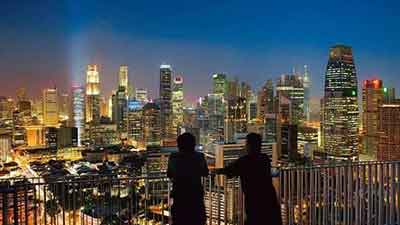Date: 17/03/2023
Relevance: GS-3: Indian Economy and issues relating to planning, mobilization, of resources, growth, development and employment.
Key Phrases: Malacca Strait, Singapore, Per Capita Income, GDP Per Capita, Economic Miracle, Authoritarianism, Investment Rates, Education System, Intelligent Policymaking, Cronyism, Banana Republic, Cultural Norms, Social Cohesion.
Context:
- Economists, anthropologists, sociologists, and political scientists view Singapore as a valuable laboratory for analysis, as it presents a multitude of complex and puzzling issues that are ripe for exploration and examination.
Introduction:
- During the pre-colonial era, Singapore was a marshy island that
served as a trading settlement due to its strategic location near the
Malacca Strait.
- Traders from India and China would pass through, and some decided to settle there. Later, traders from the Netherlands and Portugal also arrived.
- The British then colonized Singapore and brought laborers from India, Sri Lanka, and East Asia.
- The name of Singapore has an intriguing backstory. In the late 13th century, when the Buddhist prince Sang Nila Utama founded a kingdom there, he claimed to have seen a lion and named his domain Singapura, meaning "lion city" in Sanskrit.
- However, lions are not native to the region, and it was later discovered that the animal Utama saw was likely a civet, also known as a musang, which is a distant cousin of the fox. Singapore's mystique extends even to its name.
Singapore We Know Today:
- Singapore as we know it today was born on 9 August 1965, when the Malaysian parliament voted to expel the troublesome island and an independent city-state was established.
- At the time of its independence, Singapore was severely underdeveloped, with a per capita income of only around $500, which was similar to many other newly independent countries in Asia and Africa.
- However, within two decades, this small island nation with no natural
resources had transformed into one of the wealthiest countries in Asia.
- Today, Singapore boasts a GDP per capita of just under $85,000, surpassing even that of the United States.
Singapore’s Economic Miracle:
- Certain right-wing groups have put forth the notion that Singapore's
accomplishments demonstrate the effectiveness of authoritarianism.
Nevertheless, it's widely recognized that correlation doesn't entail
causation.
- As an example, economist David Hendry observed that this kind of reasoning would imply that inflation in the UK was "caused" by a Scottish E. coli outbreak.
- In reality, Singapore’s rapid growth has more to do with its high
savings and investment rates, first-rate education system and intelligent
policymaking.
- While it's true that intelligent policymaking can arise from an authoritarian leader, there's no direct link between the two.
- In fact, authoritarianism typically leads to cronyism and corruption.
- Economists sometimes overlook that economic performance depends
on factors beyond economics, such as cultural norms, social cohesion, and
public trust.
- Unlike other nations that underwent authoritarianism, Singapore's society boasts high levels of trust and isn't polarized.
- As Tharman Shanmugaratnam, the former Deputy Prime Minister and current senior minister, noted in a 2017 speech, Singapore's "identity is our brand of multiculturalism. It has made us a nation-state where citizens of all faiths and cultures accept each other as equals."
Multiculturalism in Singapore:
- During a visit to Singapore, one could observe the city-state's
multiculturalism firsthand.
- Walking down Haji Lane or Arab Street, one could easily mistake it for Istanbul or Saudi Arabia with the stunning Sultan Mosque in the background.
- Chinatown's bustling atmosphere reminds of alleyways in Shanghai or Beijing.
- Little India is particularly fascinating, where Tamil is spoken
with a distinct accent, and women wear saris with unique bindis.
- However, conversations with people revealed that while each group retained its cultural roots, they all identified as Singaporeans above all else.
Conclusion:
- Singapore's authoritarian system of government may not be the sole reason for its economic success, but it is a vital aspect of the country's character.
- The law-abiding society in Singapore, where individuals follow the fine print of rules and regulations, is a contrast to the judgment-based systems in cities like New York and London.
- While waiting for signals at crosswalks may seem inefficient, it
is a testament to Singapore's commitment to following rules and regulations.
- However, it is worth noting that a system in which people follow the spirit of the law instead of merely the fine print may be more efficient.
- Overall, Singapore's emphasis on rule-following and law-abiding behavior is an essential aspect of the country's success, and it serves as an example for other countries to consider.
Source: Live-Mint
Mains Question:
Q. What is the most effective way for governments to promote sustainable economic growth while also ensuring distributional fairness and protecting health and safety? Comment (150 words).







